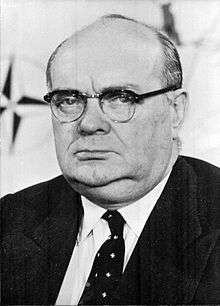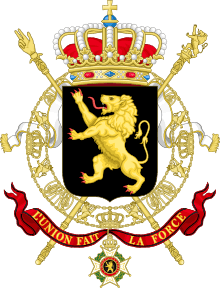Belgian general election, 1946
Belgian general election, 1946
.svg.png)
|
| 17 February 1946 (1946-02-17) |
|
|
All 202 seats in the Chamber of Representatives
102 seats needed for a majority |
| |
First party |
Second party |
Third party |
| |
.jpg) |
 |
 |
| Leader |
Hubert Pierlot |
Paul-Henri Spaak |
Julien Lahaut |
| Party |
Christian Social |
Socialist |
Communist |
| Leader since |
Candidate for PM? |
Candidate for PM |
1945 |
| Last election |
73 seats, 33.58% |
64 seats, 29.44% |
9 seats, 4.65% |
| Seats won |
92 |
69 |
23 |
| Seat change |
 19 19 |
 5 5 |
 14 14 |
| Popular vote |
1,006,293 |
746,738 |
300,099 |
| Percentage |
42.54% |
31.57% |
12.69% |
| Swing |
 8.96% 8.96% |
 2.13% 2.13% |
 8.04% 8.04% |
|
| |
Fourth party |
Fifth party |
| |
|
|
| Leader |
Roger Motz |
Pierre Clerdent
Antoine Delfosse |
| Party |
Liberal |
Democratic Union |
| Leader since |
1945 |
1945 |
| Last election |
33 seats, 17.18% |
New party |
| Seats won |
17 |
1 |
| Seat change |
 16 16 |
 1 1 |
| Popular vote |
211,143 |
51,095 |
| Percentage |
8.93% |
2.16% |
| Swing |
 8.25 8.25 |
 2.16% 2.16% |
|
|
|
General elections were held in Belgium on 17 February 1946.[1] The result was a victory for the Christian Social Party, which won 92 of the 202 seats in the Chamber of Representatives and 51 of the 101 seats in the Senate.[2] Voter turnout was 90.3%.[3]
They were the first elections after the Second World War and saw fundamental changes among the political parties. The Flemish National Union, which held 17 seats prior to the war and collaborated with Nazi Germany during the war, was outlawed. The Catholic Party changed into the Christian Social Party while the Belgian Labour Party changed into the Belgian Socialist Party. The Liberal Party suffered major losses, while the Christian Social Party and the Communist Party made major gains. Despite this, the Socialist Party led by Paul-Henri Spaak formed a minority government, which fell shortly after.
Results
Chamber of Deputies
| Party |
Votes |
% |
Seats |
|---|
| Christian Social Party | 1,006,293 | 42.54 | 92 |
| Belgian Socialist Party | 746,738 | 31.57 | 69 |
| Communist Party of Belgium | 300,099 | 12.69 | 23 |
| Liberal Party | 211,143 | 8.93 | 17 |
| Belgian Democratic Union | 51,095 | 2.16 | 1 |
| Liberal-Socialist Kartels | 37,844 | 1.60 | 0 |
| Union des métiers | 3,360 | 0.14 | 0 |
| FRENSSEN | 2,480 | 0.10 | 0 |
| Independents | 2,785 | 0.12 | 0 |
| Walloon Unity Party | 1,774 | 0.07 | 0 |
| Belgian People's Movement | 865 | 0.04 | 0 |
| Resistant | 676 | 0.03 | 0 |
| Middle Classes | 274 | 0.01 | 0 |
| Belgian Free Independents | 212 | 0.01 | 0 |
| Invalid/blank votes | 94,971 | – | – |
| Total | 2,460,609 | 100 | 202 |
| Registered voters/turnout | 2,724,796 | 90.30 | – |
| Source: Belgian Elections |
Senate
| Party |
Votes |
% |
Seats |
|---|
| Christian Social Party | 999,264 | 42.74 | 51 |
| Belgian Socialist Party | 729,943 | 31.22 | 34 |
| Communist Party of Belgium | 300,655 | 12.86 | 11 |
| Liberal Party | 214,837 | 9.19 | 4 |
| Belgian Democratic Union | 48,441 | 2.07 | 0 |
| Liberal-Socialist Kartels | 33,732 | 1.44 | 1 |
| Union des métiers | 3,764 | 0.16 | 0 |
| Demarrez | 3,753 | 0.16 | 0 |
| Independents | 3,866 | 0.17 | 0 |
| Invalid/blank votes | 106,767 | – | – |
| Total | 2,445,022 | 100 | 101 |
| Source: Belgian Elections |
References
- ↑ Nohlen, D & Stöver, P (2010) Elections in Europe: A data handbook, p289 ISBN 978-3-8329-5609-7
- ↑ Nohlen & Stöver, pp309-311
- ↑ Nohlen & Stöver, p290

.jpg)

